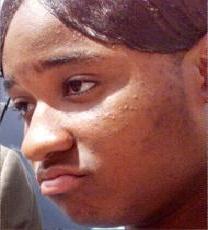 Lacresha Murray On May 24, 1996, 2-year-old Jayla Belton was dropped off at the Austin, Texas home of her babysitter, 11-year-old Lacresha Murray, who lived with her siblings and grandparents.
Late in the afternoon, Murray came rushing out a bedroom holding the toddler, saying, “She’s cold.” Her grandfather drove Murray and Jayla to a hospital where she was pronounced dead.
The following day, Travis County Medical Examiner Robert Bayardo reported that Jayla’s liver was split in half, an injury he said was inflicted minutes before the girl’s death. Further, Jayla had four broken ribs and more than 30 bruises on her body.
Police interrogated Murray, who had an IQ of 77, and she repeatedly denied knowing what happened—39 denials in all. But after enduring three hours of questioning punctuated by table pounding as well as threats to jail her and her grandparents—whom she had not seen for five days—when police suggested she could have accidentally dropped and kicked the child, Murray agreed and signed a written statement.
She was charged with capital murder, the youngest person in Texas history to face the death penalty.
In August 1996, when Murray went on trial, the primary evidence against her was the statement. In closing argument, Assistant District Attorney Gary Cobb pulled back on the capital murder charge and asked the jury to convict on a lesser offense. On August 7, the jury convicted Murray of criminally negligent homicide and injury to a child. She was sentenced to 20 years in prison.
On October 2, 1996, Judge John Dietz, who oversaw the trial, set aside the verdict and ordered a new trial, expressing concern that a miscarriage of justice had occurred because no defense had been offered on Murray’s behalf.
Murray went on trial again in February 1997. This time, Dr. Vincent DiMaio, a medical examiner, testified for the prosecution that Jayla had been kicked to death and that the tread pattern on Murray’s shoes matched the bruises on the body.
Dr. Linda Norton, a former Dallas County medical examiner, testified for the defense that Jayla was a chronically battered child whose many injuries could have been caused during attempts to revive her in the hospital emergency room. Norton said that based on reports of Jayla’s lethargic behavior that day—the girl refused to eat and only wanted to sleep—she believed that the damage to Jayla’s liver had occurred before she was dropped off. Norton testified that she believed Jayla was bleeding and “going into shock all day long.”
Murray, however, was convicted again and was sentenced to 25 years in prison.
Subsequently, the case received national attention from the media, including from the news program 60 Minutes, which recorded a statement by DiMaio retracting his claim that the sneakers matched the injuries on the girl’s body.
In April 1999, the Texas Third Court of Appeals set aside the conviction, ruling that Murray’s statement should have been suppressed. The court held that she should have been taken before a magistrate to get an explanation of her rights because she was in custody. The court also said the statement could have been the product of “fright and despair” because she was 11 years old and without a family member present.
Murray was released from prison on April 21, 1999. Her defense attorney, Keith Hampton, who twice had obtained reversals in the case, asked Dr. Joshua Perper, chief medical examiner of Broward County in Florida, to re-examine the medical evidence. Dr. Perper and concluded that Jayla's injuries were inflicted before she came to Murray's home. Perper's report was submitted to the Travis County District Attorney’s office which mulled whether to try the case for a third time for more than two years before dismissing the charges on August 13, 2001.
A civil suit seeking damages on Murray’s behalf was dismissed by a federal judge, a decision that was upheld by the Fifth Circuit U.S. Court of Appeals in June 2009.
– Maurice Possley |